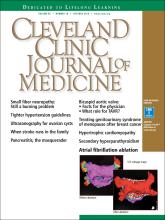ABSTRACT
When treating the genitourinary syndrome of menopause (GSM) in women with breast cancer or at high risk of breast cancer, clinicians must balance the higher cancer risks associated with hormonal treatments against the severity of GSM symptoms, which can be exacerbated by breast cancer treatments. Options for patients who need hormonal therapy include locally applied estrogens, dehydroepiandrosterone (DHEA), and estrogen receptor agonists/antagonists, which vary in their impact on breast cancer risk.
- Copyright © 2018 The Cleveland Clinic Foundation. All Rights Reserved.
- Anna Camille Moreno, DO
- Sabrina K. Sikka, MD
- Holly L. Thacker, MD⇑
- Director, Center for Specialized Women’s Health, Department of Obstetrics and Gynecology, Women’s Health Institute, Cleveland Clinic
- Professor, Cleveland Clinic Lerner College of Medicine of Case Western Reserve University, Cleveland, OH
- ADDRESS:
Holly L. Thacker, MD, Women’s Health Institute, A10, Cleveland Clinic, 9500 Euclid Avenue, Cleveland, OH 44195; thackeh{at}ccf.org
ABSTRACT
When treating the genitourinary syndrome of menopause (GSM) in women with breast cancer or at high risk of breast cancer, clinicians must balance the higher cancer risks associated with hormonal treatments against the severity of GSM symptoms, which can be exacerbated by breast cancer treatments. Options for patients who need hormonal therapy include locally applied estrogens, dehydroepiandrosterone (DHEA), and estrogen receptor agonists/antagonists, which vary in their impact on breast cancer risk.
- Copyright © 2018 The Cleveland Clinic Foundation. All Rights Reserved.






